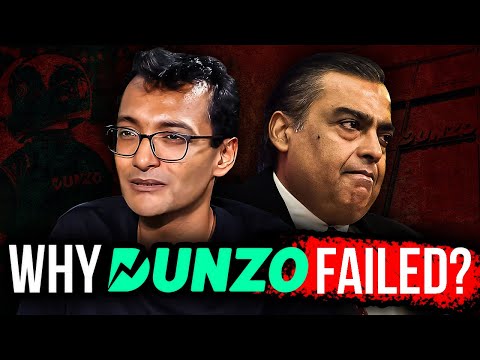00:00 – Intro
01:03 – How Dunzo Began?
02:30 – First Funding & Growth
03:12 – First Wrong Move
05:29 – Reliance’s Deal
06:40 – What can we learn?
Sources:
https://www.linkedin.com/pulse/dunzo-fundraise-mr-biswas-his-amazing-team-sahil-kini/
https://www.youtube.com/watch?v=qA2ph8h8Gf0&t=406s&ab_channel=AJuniorVC
https://the-ken.com/story/dunzo-fans-made-it-a-verb-then-it-became-just-another-delivery-firm/
https://inc42.com/features/the-dunzo-breakdown/
Dunzo, once a promising startup, now faces the imminent threat of shutting down. The company, founded by Kabeer Biswas, entered the hyperlocal delivery market in India, becoming one of the early players in a landscape where concepts like hyperlocal delivery were novel. Kabeer, inspired by Uber, envisioned an app that could handle various tasks with a single click.
Dunzo’s journey began informally as a WhatsApp group where people could request tasks, and Kabeer would personally handle them. As the company grew, it transitioned into a formal business. Sahil Kini of Lightrock became their first investor after receiving a delivery from Kabeer. The subsequent years saw remarkable growth, with monthly orders soaring from 15,000 in 2016 to over 2 million by 2021, marking a 130X increase. However, this growth came with substantial financial losses, as Dunzo focused on gaining subscribers.
In 2020, Dunzo’s fortunes seemed to turn as active users nearly doubled, and financials showed signs of improvement. Sensing an opportunity in quick commerce, Dunzo secured a $40 million funding round and launched Dunzo Daily. However, this move proved detrimental. Quick commerce demanded a different infrastructure, relying on the ‘Dark Store’ model, which required substantial investment. Dunzo faced stiff competition from Swiggy’s Instamart, Zomato’s Blinkit, Tata’s BigBasket, and Zepto, diluting its exclusivity. Despite raising over $400 million, Dunzo struggled to compete and eventually faced a dire cash flow situation.
In 2023, with co-founders leaving and funds depleting, Dunzo turned to Reliance for a lifeline. Reliance acquired a 26% stake in Dunzo for $200 million, providing crucial capital but also securing veto powers over significant decisions. Reliance declined additional funding, leading to a disagreement and further financial constraints. As two co-founders abandoned ship, Dunzo retreated, shutting down quick commerce operations in multiple cities, leaving only seven dark stores operational in Bengaluru.
Dunzo is currently fighting for survival, reverting to its hyperlocal delivery model. Reports suggest that the company’s monthly burn rate exceeds 100 Crore Rs, with less than 500 crore in the bank. Without a quick injection of funds, Dunzo faces the possibility of closure.
The lessons from Dunzo’s downfall are clear. Startups should be cautious not to lose their unique selling proposition (USP) when venturing into new segments. Dunzo, once the king of hyperlocal, lost its edge when it entered quick commerce, becoming just one among many. Additionally, operational profitability in the core business should precede expansion into new segments. Finally, aligning with the right investors is crucial when competing against well-funded companies. Unlike its competitors with strong backing, Dunzo’s reliance on Reliance as a strategic investor with its own agenda may have contributed to its downfall.
In conclusion, Dunzo’s journey from a promising startup to the brink of closure underscores the importance of strategic decisions, financial prudence, and maintaining a distinct market position in the competitive startup landscape.
Connect with us:
Twitter: https://twitter.com/bwmillionaires/
LinkedIn: https://www.linkedin.com/company/backstagewithmillionaires
Instagram: https://www.instagram.com/backstagewithmillionaires/
Podcast: https://open.spotify.com/show/5rGPalovc6AKsfbOyjh32p




